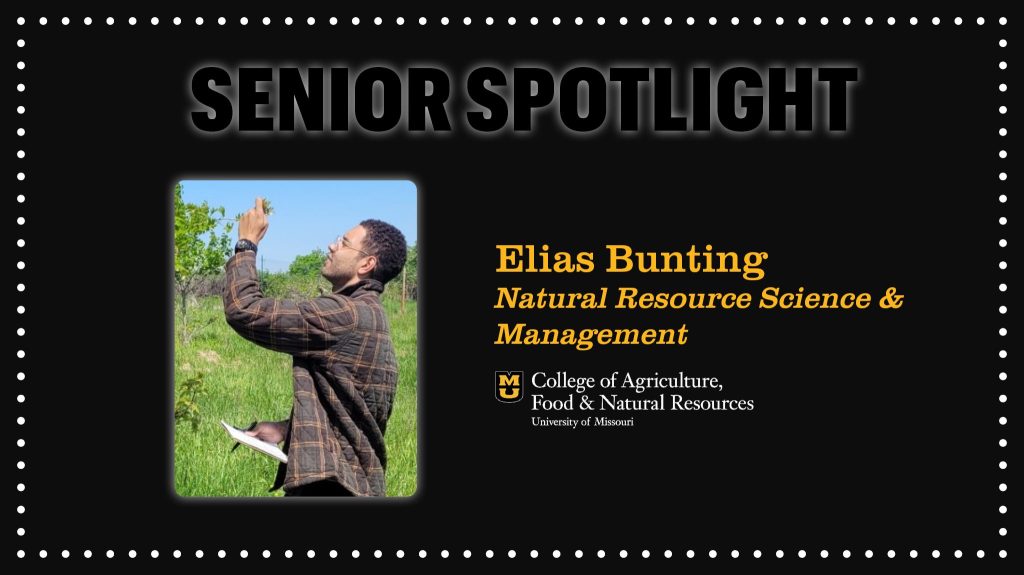
Elias Bunting has been able to gain valuable research experiences as an undergraduate student at the University of Missouri through the McNair Scholars Program. Bunting, who will earn his natural resource science and management degree in May, has spent nearly three years taking part in various research projects across the Mizzou campus.
Those hands-on research opportunities have opened multiple doors for Bunting, including setting him up for a graduate school opportunity at University of California, Davis (UC Davis) later this year.
“My research opportunities at MU have been invaluable,” Bunting said. “I know I have been fortunate to get into some great labs that have really supported me in multiple ways, especially through helping me find funding. The McNair Scholars Program also was phenomenal in setting me up for success. The graduate school application process wouldn’t have been as smooth without their help. One of the main focuses of the program is to provide students who want to go to graduate school the means to do so, and they definitely carry that out.”
Bunting, who is from Liberty, Mo., said it took a little bit of time for him to settle on the natural resource science and management degree program. But once he did, he knew it was the perfect choice for his interests.
“I did bounce around a little bit,” Bunting said. “I knew I wanted to work with living things, and after talking with Dr. (Sarah) Humfeld (assistant director of the Office of Undergraduate Research), she suggested natural resource science and management. Once I got going in the program, I knew it was going to be a great fit.”
Bunting was involved briefly in the Missouri Coronavirus Sewershed Surveillance Project, a collaboration between the Missouri Department of Health and Senior Services (DHSS), the Missouri Department of Natural Resources (DNR), and MU. Bunting served in a couple of different roles, including sample collection and getting those samples ready for testing.
Bunting followed that research opportunity with a project centered on black walnuts, where he worked with Ronald Revord, an assistant research professor in the School of Natural Resources. Bunting wore multiple hats during that project as well.
“We have a black walnut germplasm, which includes genotypic data, that was compiled over a 15-year period,” Bunting said. “I spent time studying that germplasm to see if there are any variations in the dataset that we can leverage for selecting black walnut parents that we can breed together to produce an offspring that brings high economic value to Missouri. Along with combing through the germplasm, I also did a lot of black walnut evaluation and evaluations of individual trees.”
To go along with his research, Bunting said he served as a CAFNR Ambassador for a short period of time and was part of the Forestry Club for about a year. He was also part of the Louis Stokes Alliances for Minority Participation (LSAMP), an NSF-sponsored program designed to broaden participation in science, technology, engineering and technology (STEM) disciplines and increase the number of students receiving bachelor’s degree and ultimately graduate degrees in STEM disciplines.
Bunting also had a full-time job at Rock Bridge Memorial State Park.
“The hands-on opportunities have been the best part of my time at Mizzou,” Bunting said. “My work at Rock Bridge Memorial State Park, for example, was a great interpretive experience, where I was not only able to lead cave tours and work with plants, but also gain an understanding of implementing long-term plans for a park.”
Bunting will begin his graduate studies at UC Davis this fall. He will work in the lab of Neil McRoberts, a professor of plant pathology. Bunting said McRoberts’ lab is focused on citrus greening, a serious citrus plant disease.
“I’m excited to study in another part of the country; I think it’s really going to add to the knowledge I’ve already gained here at MU,” Bunting said. “I’m very familiar with Midwestern ecology, and I’m excited see what I can learn on the west coast. The research is going to be very interesting as well, as citrus greening causes an infection that is hard to detect and it multiples rapidly. The lab I’ll be joining is looking at creating solutions to combat that disease.”
Bunting said that he would encourage students who are interested in research to get involved as soon as possible. He added that he was thankful for the McNair Scholars Program for helping guide him through his research opportunities.
“If you’re interested in research, even just a little bit, go and do it,” Bunting said. “There were some activities where I didn’t think it would be for me, but I went anyway. Sometimes I was right, and it didn’t connect, but there were times where I was surprised and found something I really enjoyed. There are so many opportunities at Mizzou. As I made connection and saw all of the resources early on, I really fell in love with MU and realized how lucky I was to be where I was.”